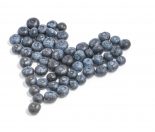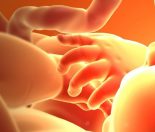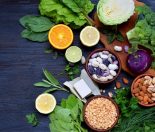In association with professional midwife experts at birthEd, find out everything you need to know about pregnancy at 8 weeks, including how your baby is growing, changes to expect in your body and pregnancy health, nutrition and wellness advice.
| Week 7 |
Week 9 |
8 Weeks Pregnant – Your baby, your body & you
Your Baby
Your baby is now around 1.2cm to 1.8cm. Growth spurts are happening all over your baby’s body so the overall size is hard to determine. Your baby is starting to “flex its wings”, wiggling it’s little limbs and starting to develop a sense of touch, touch is the first sense to develop.
By the end of week 8, all your baby’s main organs and body systems are underway in their development including the retinas of the eyes and the pigment within them beginning to form, cartilage is becoming bone and your baby’s tail is almost gone. This week they’re upgrading from embryo to fetus!
Your Body
Two months pregnant, and you are likely feeling more pregnant this week than the weeks before. Nausea, food aversions, bloating/constipation, fatigue and increased vaginal discharge are becoming daily occurrences. Although these symptoms are far from fun, they have some importance.
The increased vaginal discharge is known as leucorrhea and it is important for protecting your birth canal from infection. It increases the acidity of your vagina and at the same time also regulates a harmonious balance of the normal bacteria to help you remain healthy and infection free. This provides protection from some pathogens however Candida albicans (also known as thrush) and Trichomonas vaginalis (an STI) can flourish in this environment.
If you experience:
- Itching or irritation, redness and swelling of the vagina and vulva
- A thick, white, vaginal discharge (little cottage cheese in consistency) or a foul smelling grey, yellow or green discharge
- Pain or burning during urination or intercourse
it is important that you see your doctor for a diagnosis and treatment.
Now is a great time to invest in a supportive and wire free bra. Your breasts are going to feel increasingly heavy and uncomfortable as time goes on.
The milk producing ducts in your breasts are starting to expand and there is increased blood flow as they prepare to produce breast milk for when your baby arrives. Supportive bras throughout pregnancy can prevent future tissue damage and therefore future sagging.
You
During pregnancy your body’s demand for iron increases. Iron is used by your body to make red blood cells in the form of haemoglobin, this is required during pregnancy to supply maternal and fetal tissues with oxygen. Iron also plays an important role in the birth weight, time of birth and memory of your baby.
Low iron levels are also linked to maternal post-partum hemorrhage due to anemia as well as emotional instability and depression following birth.
When you’re not getting enough iron in your diet you can develop anemia. Anemia is a very common micronutrient deficiency during pregnancy and is easily treated with an increase in your iron intake through diet and/or through supplementation. About 40% of women in New Zealand have an inadequate level of iron stores.
Symptoms of anemia include exhaustion, low immunity and deficits in concentration, these symptoms can easily be confused with early pregnancy symptoms so ask your LMC to have your iron levels checked if this is something you are experiencing.
Your iron levels are continuously monitored during routine blood tests throughout your pregnancy, as it’s important to keep these levels up. Iron supplementation is recommended on an individual need in New Zealand.
However, knowing the benefits of increased iron stores we recommend that throughout your pregnancy you have a daily intake of at least 27mg. Your body needs vitamin C to absorb greater amounts of iron. Vitamin C has been shown to increase the absorption by four-fold and it’s recommended to take an excess of 200mg of vitamin C with your iron (a glass of orange juice has approximately 53.2mg). Check the amount of vitamin C in your prenatal vitamin or supplement with additional vitamin C.
Eating iron rich foods is a great way to increase your iron stores, examples include red meats, salmon and dark leafy greens. Establishing a good diet throughout pregnancy is paramount to you and your baby’s health.
Preparing for Baby
Around week 8 you’re likely to be booked in for your initial bloods, urine and dating scan. These can be organised by your GP if you haven’t found a suitable LMC yet. You will have your blood tested at 28 and 36 weeks, so it’s good to get familiar with your local blood testing lab.
The dating scan will identify the size and development of your baby and you’ll be given an estimated due date (EDD) based on this information and the first day of your last period.
The initial blood work will test your blood group, a full blood count, if there are any antibodies that may be harmful to your baby, your immunity to rubella, if you are a hepatitis B carrier, if you have syphilis or HIV and if you have diabetes. Check out the info on Health.govt.nz if you’d like more information about this blood test.
Your Relationships
As your transformation into pregnancy begins to really set in, with your hormones going crazy and your pregnancy still not visible, so there may be an expectation of you to carry on as before (especially from people who don’t know you’re pregnant yet), it’s easy to forget about self-care.
This week we’ll be focusing on the most important relationship, your relationship with yourself. You already know it, your mental health is just, if not more, important than your physical health – but looking after your physical health can support your mental space.
Why don’t you make a list of the things you know fill up your cup? Perhaps it’s going for a walk in nature, snuggling up on the couch with a book, journaling or a bubble bath?
Try to make space everyday this week to carry out an activity on this list and when you are doing them, remind yourself that this is your time for you. You’ve set this time aside, distraction free, guilt free because you are important and your wellbeing matters.
Although selfcare isn’t as simple as putting a face mask on, it’s a simple place to start. We’ll be exploring some of the deeper self-exploration and personal work throughout this programme.
This Week’s Preparation
Listen to your body. Are you tired? Can you make time to rest?
Have you found an LMC? (Check week 5 email for more info).
Schedule your first antenatal visit.
Book in your first blood test (your LMC or GP will give you a lab form).
Eat small nutritious meals more frequently to avoid morning sickness.
Take your prenatal vitamins, iodine, additional folic acid supplement and consider an iron supplement.
Cut back on your caffeine intake.
Increase your consumption of fruit and vegetables and cut back refined sugar and trans-fats.
Back to 52 Weeks of pregnancy.







